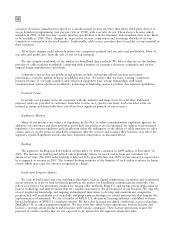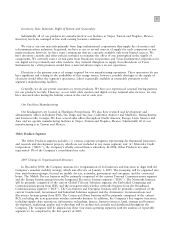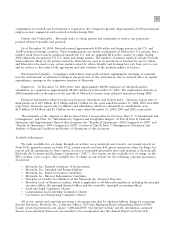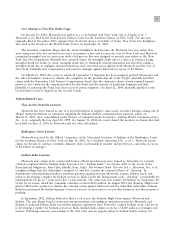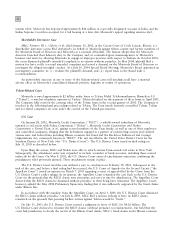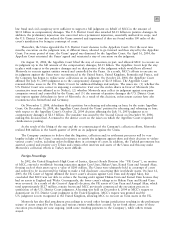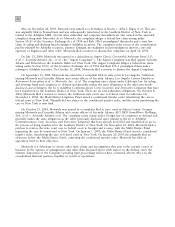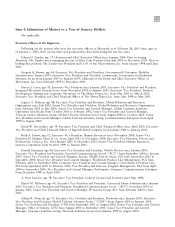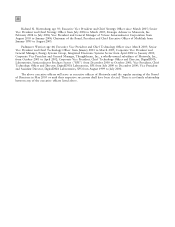Motorola 2004 Annual Report Download - page 31
Download and view the complete annual report
Please find page 31 of the 2004 Motorola annual report below. You can navigate through the pages in the report by either clicking on the pages listed below, or by using the keyword search tool below to find specific information within the annual report.
23
law fraud and civil conspiracy were suÇcient to support a full judgment on behalf of MCC in the amount of
$2.13 billion in compensatory damages. The U.S. District Court also awarded $2.13 billion in punitive damages. In
addition, the preliminary injunction was converted into a permanent injunction, essentially unaltered in scope, and
the U.S. District Court also ordered the Uzans arrested and imprisoned if they are found within 100 miles of the
court's jurisdiction for being in contempt of court.
Thereafter, the Uzans appealed the U.S. District Court decision to the Appellate Court. Over the next nine
months, execution on the judgment was, at diÅerent times, allowed to go forward and then stayed by the Appellate
Court. For some period of time, the Uzans' appeal was dismissed by the Appellate Court. On April 16, 2004, the
Appellate Court reinstated the Uzans' appeal and reinstated a stay of execution on the judgment.
On August 11, 2004, the Appellate Court lifted the stay of execution, in part, and allowed MCC to execute on
its judgment up to the full amount of the compensatory damages, $2.13 billion. The Appellate Court kept the stay
in place with respect to the punitive damages and on that portion of the judgment which would have allowed
Motorola to execute against entities owned and controlled by the Uzans. As a result, MCC's eÅorts to execute on
its judgment against the Uzans were recommenced in the United States, United Kingdom, Bermuda and France, and
the Company has begun to realize some collections on its judgment. On October 22, 2004, the Appellate Court
aÇrmed the July 31, 2003 judgment as to the compensatory damages of $2.13 billion. The Appellate Court
remanded three issues to the U.S. District Court for additional Ñndings and analysis. The issues are: (1) whether the
U.S. District Court was correct in imposing a constructive trust over the stolen shares in favor of Motorola (the
constructive trust was aÇrmed as to Nokia); (2) whether Motorola may collect its judgment against non-party
companies owned and controlled by the Uzans, and (3) the amount of punitive damages the U.S. District Court
may impose against defendants in favor of Motorola. As a result of this decision, enforcement actions have also
recommenced in Switzerland and Germany.
On November 5, 2004, defendants Ñled a petition for rehearing and rehearing en banc by the entire Appellate
Court. On December 16, 2004, the Appellate Court denied the Uzans' petition for rehearing and rehearing en banc
with respect to the Appellate Court's October 22, 2004 decision aÇrming the July 31, 2003 judgment as to
compensatory damages of $2.13 billion. The mandate was issued by the Second Circuit on December 30, 2004,
making this decision Ñnal. A remand to the district court on the issues on which the Appellate Court requested
clariÑcation is pending.
As the result of the lifting of the stay and the re-commencing of the Company's collection eÅorts, Motorola
realized $44 million in the fourth quarter of 2004 on its judgment against the Uzans.
The Company continues to believe that the litigation, collection and/or settlement processes will be very
lengthy in light of the Uzans' continued resistance to satisfy the judgment against them and their decision to violate
various courts' orders, including orders holding them in contempt of court. In addition, the Turkish government has
asserted control and priority over Telsim and certain other interests and assets of the Uzans and this may make
Motorola's collection eÅorts in Turkey more diÇcult.
Foreign Proceedings
In 2002, the United Kingdom's High Court of Justice, Queen's Bench Division (the ""UK Court''), on motion
of MCC, entered a worldwide freezing injunction against Cem Uzan, Hakan Uzan, Kemal Uzan and Aysegul Akay,
freezing each of their assets up to a value of $200 million. The Uzans were ultimately held in contempt of court
and ordered to be incarcerated for failing to make a full disclosure concerning their worldwide assets. On June 12,
2003, the UK Court of Appeal aÇrmed the lower court's decision against Cem Uzan and Aysegul Akay, but
concluded that MCC was not able to enforce the freezing order against Hakan Uzan and Kemal Uzan because they
had no assets in England and Wales. Consequently, the lower court's rulings as to Hakan Uzan and Kemal Uzan
were reversed. As a result of the Court of Appeal's decision, the UK assets of Cem Uzan and Aysegul Akay, which
total approximately $12.7 million, remain frozen and MCC previously commenced the execution process in
satisfaction of the U.S. District Court judgment. A hearing was held on December 6, 2004 at MCC's request to
domesticate its U.S. District Court judgment in the United Kingdom. MCC's request was granted and the
U.S. judgment is now recognized in the United Kingdom, allowing MCC to execute on Uzan assets in the UK.
Motorola has also Ñled attachment proceedings in several other foreign jurisdictions resulting in the preliminary
seizure of assets owned by the Uzans and various entities within their control. As set forth above, some of these
execution proceedings are now ongoing (with some resulting payments to the Company), while others remain
stayed.





